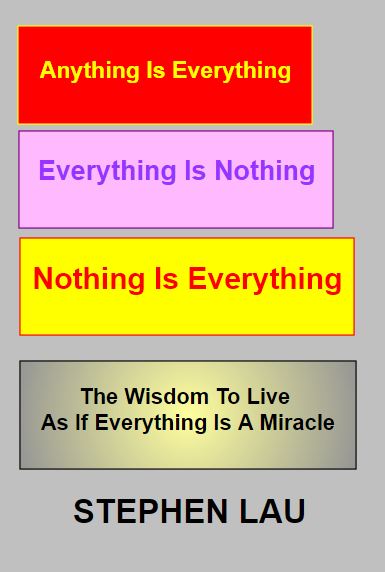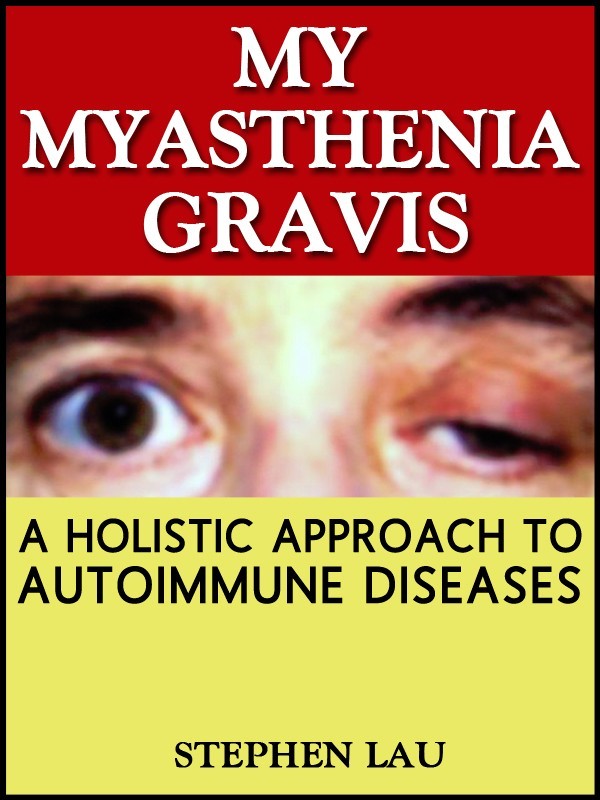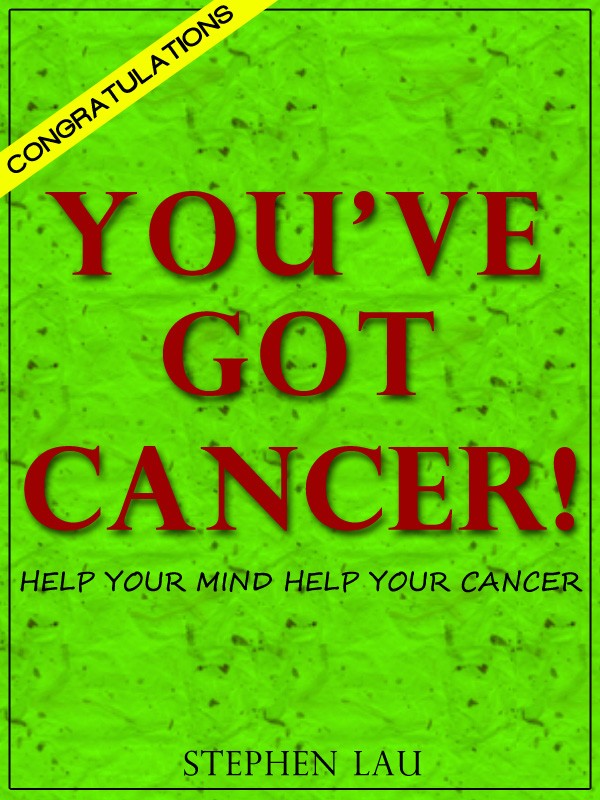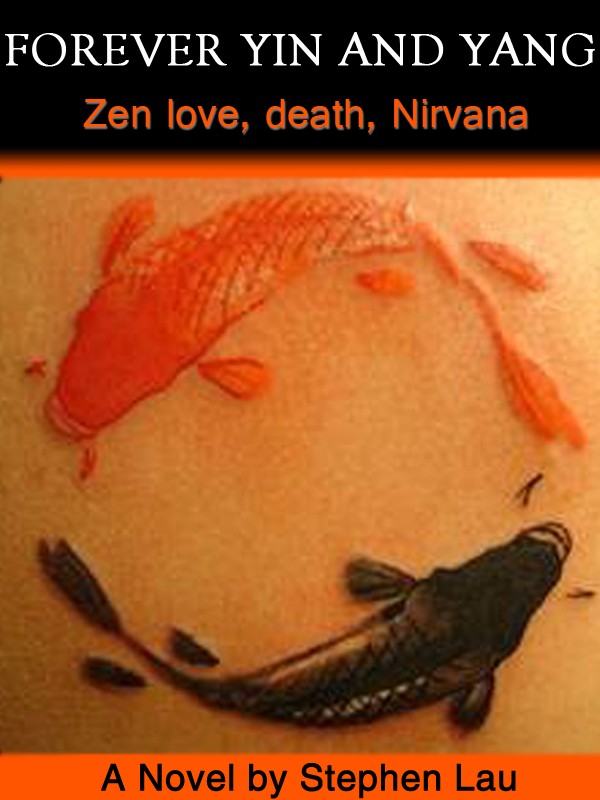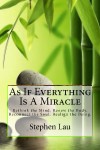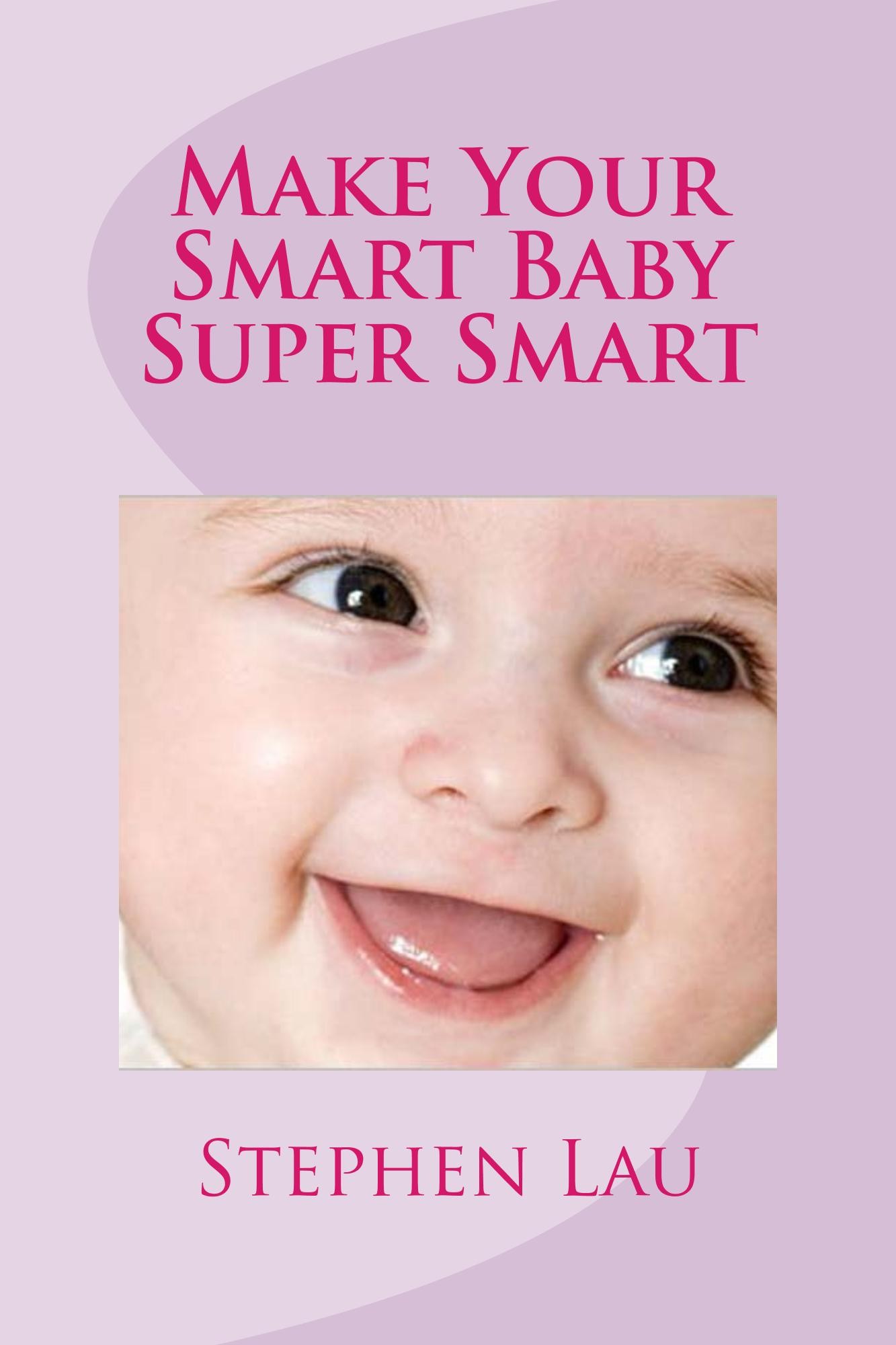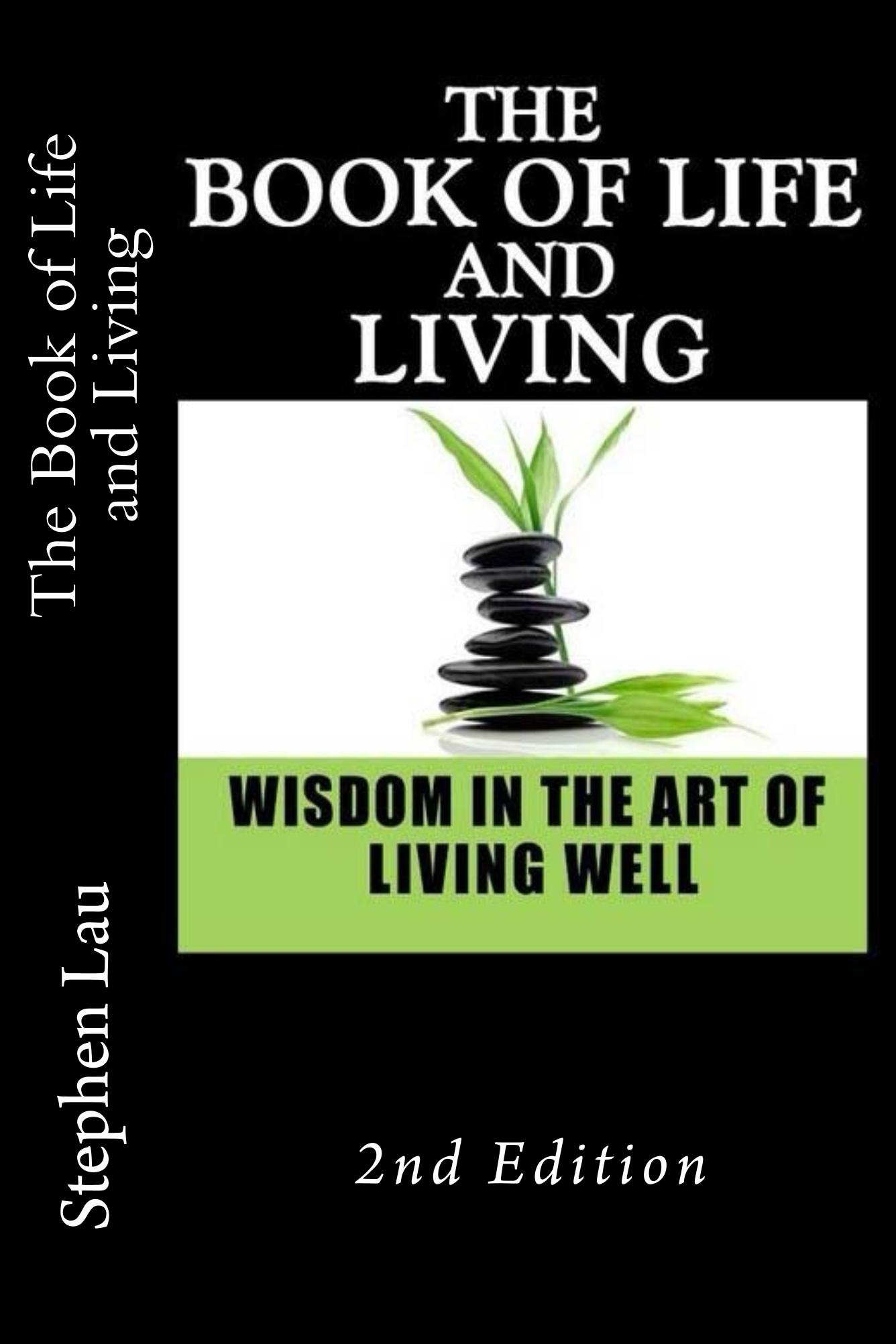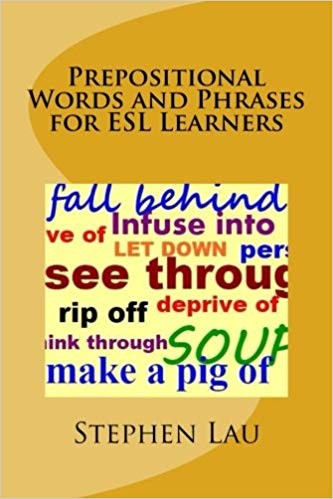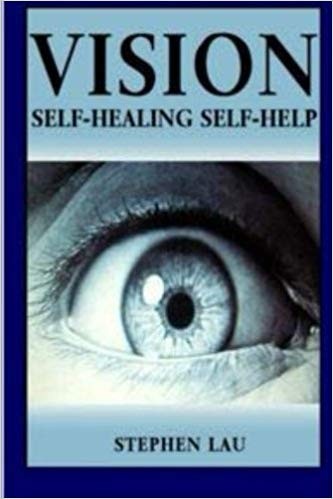
BOOKS
by
Stephen Lau
by
Stephen Lau
BOOKS
by
Stephen Lau
by
Stephen Lau
BLOG




BLOG:
The TAO
BLOG:
The healing
BLOG:
The new way of life
BLOG:
The living tips
BLOG:
The better English
The TAO
BLOG:
The healing
BLOG:
The new way of life
BLOG:
The living tips
BLOG:
The better English
ANYTHING, EVERYTHING, AND NOTHING
Living in this material world is all about struggling and surviving. The good news is that it is a human race in which there are really no real winners and losers in the end. But no matter what, we all have to finish that race somehow, with no exception. Just do your very best, and let the Creator do the rest to help you finish your own race with grace and dignity. The wisdom of your body, your mind, and your spirit may awaken and rejuvenate you along the rest of your life journey.
Living is always a discovery process. Life is a journey of self-discovery-finding who you are, why you are here, what you really need, and how you may meet your basic needs, so that you, like every one else, can fulfill some of your life goals and purposes that are exclusively designed for you. But to do just that, you need profound human wisdom and spiritual wisdom to continue that journey as if everything is a miracle.
Albert Einstein once said: “There are only two ways to live your life. One is as if nothing is a miracle. The other is as if everything is a miracle.”
Indeed, life is a miracle in itself. Being alive is a miracle. Having your breaths is already a miracle. Everything in life is a miracle.
To truly believe and appreciate the miracle of life, you need the wisdom to grasp the full meaning of anything is everything, everything is nothing, and nothing is everything-they may all ultimately lead to your self-awakening, without which you will continue to live as if nothing is a miracle.
ANYTHING IS EVERYTHING! EVERYTHING IS NOTHING! NOTHING IS EVERYTHING!
Stephen Lau
Copyright© by Stephen Lau
***************************************
A FROG IN A WELL
In many ways, many of us are just like a frog in a well, looking up at the limited sky above, in that we see only ourselves, and no one else, and therefore anything is everything to us. In other words, we see only our own needs and desires that have to be fulfilled and gratified no matter how, but without seeing those in others.
Near the end of 2016, a road rage occurred in Arkansas that ended in the tragic death of a 3-year-old child.
A woman, with her 3-year-old grandson sitting at the back of her car, stopped at a stop sign. A man in the car right behind honked her for not starting her car immediately, but the woman honked back; thus the road rage began with the man firing a gun shot at the back of the woman’s car.
Stopping too long at a stop sign, or wanting to get to a place on time might be everything to the man. Having the right to remain where she was might also be everything to the woman, so she naturally honked back.
Unfortunately, that anything-is-everything incident ended in tragedy-the death of the woman’s three-year-old grandson being shot dead while sitting at the back of her car.
In real life, anything could be everything to real people-it all depends on their respective perspectives of anything is everything.
Just like the man in the car rage who saw only his own need to get going, but without even considering why the woman might be stalling her car at the stop sign and not moving ahead right away.
The above example also illustrates another basic but major human flaw-the “inflated” ego-self, which is focusing too much on “anything is everything” related to an individual’s ego-self.
We are all created to be in this world for only one purpose: to be our true self. Conventional wisdom often tells us to find our role model, pursue our life goals based on that role model. Subconsciously, we may all begin to dream that we are that role model or someone else that we are not, instead of being who we are supposed to be. That is how we may all have created an ego for ourselves; worse, we may even believe that we have to somehow gratify our ego-self in order to feel happy and contented.
The truth of the matter is that we all have an ego, and that is why we all, without any exception, have experienced unhappiness to a certain extent at some points in our lives. Unfortunately, the human ego is also the underlying cause or the main source of all human miseries and sufferings. That is to say, the human ego is the human flaw responsible for most of the problems and troubles that we are all facing in our lives.
The reality is that we cannot get rid of our ego because it is our uniquely individual identity. Having said that, we can still somehow diminish its size, or at least not letting it get out of control and dominate us eventually. Remember, the size of your ego is directly proportionate to the degree of distortion of your thinking mind, creating the so-called “realities” in your mind, which often are biased and untrue.
Your ego is your perceived identity, which is neither a social security number nor just a face. Your identity is your inner self or your self-worth as a person that you perceive. Many people even strive to build their identities by manipulating acceptance and attention from others. Sadly, that usually does not work: your true identify should be based on how you perceive yourself, rather than on how you perceive what others may think of you. That is to say, your true identity should not be built upon your own inflated ego.
The bottom line: like a frog in a well, with only limited and imperfect vision and perception of the sky above, you may then unconsciously distort your thinking mind with your inflated ego.
To be the frog that jumps out of the well to see anything and everything totally different, you need both human wisdom and spiritual wisdom.
THE WISDOM OF LETTING GO
NO EGO NO STRESS
Stephen Lau
Copyright© by Stephen Lau
Living in this material world is all about struggling and surviving. The good news is that it is a human race in which there are really no real winners and losers in the end. But no matter what, we all have to finish that race somehow, with no exception. Just do your very best, and let the Creator do the rest to help you finish your own race with grace and dignity. The wisdom of your body, your mind, and your spirit may awaken and rejuvenate you along the rest of your life journey.
Living is always a discovery process. Life is a journey of self-discovery-finding who you are, why you are here, what you really need, and how you may meet your basic needs, so that you, like every one else, can fulfill some of your life goals and purposes that are exclusively designed for you. But to do just that, you need profound human wisdom and spiritual wisdom to continue that journey as if everything is a miracle.
Albert Einstein once said: “There are only two ways to live your life. One is as if nothing is a miracle. The other is as if everything is a miracle.”
Indeed, life is a miracle in itself. Being alive is a miracle. Having your breaths is already a miracle. Everything in life is a miracle.
To truly believe and appreciate the miracle of life, you need the wisdom to grasp the full meaning of anything is everything, everything is nothing, and nothing is everything-they may all ultimately lead to your self-awakening, without which you will continue to live as if nothing is a miracle.
ANYTHING IS EVERYTHING! EVERYTHING IS NOTHING! NOTHING IS EVERYTHING!
Stephen Lau
Copyright© by Stephen Lau
***************************************
A FROG IN A WELL
In many ways, many of us are just like a frog in a well, looking up at the limited sky above, in that we see only ourselves, and no one else, and therefore anything is everything to us. In other words, we see only our own needs and desires that have to be fulfilled and gratified no matter how, but without seeing those in others.
Near the end of 2016, a road rage occurred in Arkansas that ended in the tragic death of a 3-year-old child.
A woman, with her 3-year-old grandson sitting at the back of her car, stopped at a stop sign. A man in the car right behind honked her for not starting her car immediately, but the woman honked back; thus the road rage began with the man firing a gun shot at the back of the woman’s car.
Stopping too long at a stop sign, or wanting to get to a place on time might be everything to the man. Having the right to remain where she was might also be everything to the woman, so she naturally honked back.
Unfortunately, that anything-is-everything incident ended in tragedy-the death of the woman’s three-year-old grandson being shot dead while sitting at the back of her car.
In real life, anything could be everything to real people-it all depends on their respective perspectives of anything is everything.
Just like the man in the car rage who saw only his own need to get going, but without even considering why the woman might be stalling her car at the stop sign and not moving ahead right away.
The above example also illustrates another basic but major human flaw-the “inflated” ego-self, which is focusing too much on “anything is everything” related to an individual’s ego-self.
We are all created to be in this world for only one purpose: to be our true self. Conventional wisdom often tells us to find our role model, pursue our life goals based on that role model. Subconsciously, we may all begin to dream that we are that role model or someone else that we are not, instead of being who we are supposed to be. That is how we may all have created an ego for ourselves; worse, we may even believe that we have to somehow gratify our ego-self in order to feel happy and contented.
The truth of the matter is that we all have an ego, and that is why we all, without any exception, have experienced unhappiness to a certain extent at some points in our lives. Unfortunately, the human ego is also the underlying cause or the main source of all human miseries and sufferings. That is to say, the human ego is the human flaw responsible for most of the problems and troubles that we are all facing in our lives.
The reality is that we cannot get rid of our ego because it is our uniquely individual identity. Having said that, we can still somehow diminish its size, or at least not letting it get out of control and dominate us eventually. Remember, the size of your ego is directly proportionate to the degree of distortion of your thinking mind, creating the so-called “realities” in your mind, which often are biased and untrue.
Your ego is your perceived identity, which is neither a social security number nor just a face. Your identity is your inner self or your self-worth as a person that you perceive. Many people even strive to build their identities by manipulating acceptance and attention from others. Sadly, that usually does not work: your true identify should be based on how you perceive yourself, rather than on how you perceive what others may think of you. That is to say, your true identity should not be built upon your own inflated ego.
The bottom line: like a frog in a well, with only limited and imperfect vision and perception of the sky above, you may then unconsciously distort your thinking mind with your inflated ego.
To be the frog that jumps out of the well to see anything and everything totally different, you need both human wisdom and spiritual wisdom.
THE WISDOM OF LETTING GO
NO EGO NO STRESS
Stephen Lau
Copyright© by Stephen Lau
THE WISDOM OF POSITIVE LIFE ATTITUDES
The art of living well is to develop positive life attitudes for positive living. To live well for the rest of your life, you need to know how to develop your positive life attitudes.
An attitude is no more than a thought powered by words and images. In life, every thought counts because your whole being is composed of thoughts. Research studies have indicated the importance of mind power: thoughts can even turn on or turn off a particular gene responsible for a particular disease or disorder; that is to say, your thoughts impact your health, and everything else in your life.
The art of living well is to utilize mind power to develop positive life attitudes for positive living. The key to dynamic living is having positive life attitudes, which can bring about physical and mental transformation, as well as emotional and spiritual unfolding.
There are seven positive life attitudes in the art of living well:
(1) Develop a positive attitude of change. Do not resist change because everything in life is changing. You cannot stay exactly where you are, even though it may be your comfort zone. Nothing is set in stone; life offers only few absolutes. A change may be positive or negative. The key to the art of living well is to embrace any change as it comes along, instead of resisting it.
(2) Develop a positive attitude of imitating the habits and behaviors of role models. Choose the ones you admire, and learn from them.
(3) Develop a positive attitude of seeing your future self in your mind’s eye. A picture is worth a thousand words. If you can imagine it, you can achieve it. Harness the power of visualization to make it more “real” to you., and this gives you incentive to pursue your life goals.
(4) Develop a positive attitude of being in control. A positive attitude stems from an internal focus of control, which means you always act instead of reacting, and you are always the master of a situation, instead of the victim.
(5) Develop a positive attitude of doing the best you can do, and leaving the rest to God. A positive attitude focuses on the process and not the outcome of any endeavor you are undertaking.
(6) Develop a positive attitude of passion-passion for life, and enthusiasm for whatever you do, however insignificant it may seem. If you choose to do anything, however insignificant it may be, you do it well. Just as Martin Luther King Jr. once said: “If a man is called to be a street sweeper, he should sweep streets even as Michelangelo painted, or Beethoven composed music, or Shakespeare wrote poetry. He should sweep streets so well that all the host of heaven and earth will pause to say, ‘Here lived a great street sweeper who did his job well.’”
(7) Develop a positive attitude of choice. Life is full of choices in matters of work, relationships, or how you feel about yourself. You cannot control what people do to you or the circumstances you may find yourself in, but you can choose to react differently or to have different perspectives.
Developing positive life attitudes holds the key to the art of living well.
Instant Positive Attitude gives you strategies to adjust your attitude for massive success in life.
Stephen Lau
Copyright© Stephen Lau
***********************************************************
THE LAW OF ATTRACTION
“Every adversity, every failure, every heartache carries with it the seed of an equal or greater benefit.” - Napoleon Hill
The wisdom is that an adversity may be a blessing in disguise. Worse, if one dwells on the adversity, one may attract more adversities.
The Law of Attraction is about energy attraction: positive energies attracting positive energies, and the same for negative energies. This revolutionary concept has been exponentially popularized by the film "The Secret" as well as by the bestseller book and other related publications across the Internet.
Is the Law of Attraction a myth of the mind or a reality in real life? Can the Law of Attraction really help your healing from diseases and disorders?
Say, when an individual is diagnosed with cancer, that individual often becomes obsessed with anxiety about its treatment options as well as the prognosis of the disease. Obsession with cancer may internalize it into self-doubt and even fear. If an individual is preoccupied with the thought that breast cancer runs in the family, that individual may have predominant thoughts of cancer. Even "positive" thoughts, such as "I am not going to get breast cancer like my mother, my grandmother, or my sister" will only attract negative energy into that individual's life, because the mind only sees the word "cancer" and the "cancer fear" and nothing else. Just as a person buying a lottery ticket will not be attracting energy of abundance, because the mind is focusing on the lack rather than on the abundance, and thus attracting negative and not positive energy.
Once you have decided on what you want: a clean bill of health, you proceed to changing your thoughts and feelings. This may not happen right away, it may take time and effort to shift your thoughts, language, and emotions. Develop positive affirmations and self-suggestions to help you day in and day out. Keep the end in mind, that is, the core values in your life. Live everyday of your life in alignment with what you believe in Hold in your mind the ideal of the condition you wish to realize, the ideal reality you want to experience. The affirmation "I am whole and healthy .....I am loving and compassionate.....I am strong and powerful" holds the key to attaining natural health wisdom.
Abundance in natural health will not come to you out of the sky; neither will it drop into your lap. You must focus on the Law of Attraction and how you will bring this law to attract positive health energies. Make a powerful statement of intent to regain your natural health at all costs. Hold in mind the ideal condition you desire. Use a powerful affirmation and mental imagery to affirm it as an already existing fact until it is absorbed by your subconscious mind to give you the internal life energy.
Congratulations. You've Got Cancer: Learn how to use your mind to overcome the anxiety of a cancer diagnosis. Empower your mind to cope with cancer.
Stephen Lau
Copyright© by Stephen Lau
***********************************************************
THE WISDOM OF WALKING TO DE-STRESS
To be diagnosed with an autoimmune diseases is not only devastating but also stressful, especially if the doctor tells you that there is no cure, except controlling the disease symptoms with steroid medications.
The first and foremost thing to do is to de-stress yourself so that you will have clarity of mind to deal with the health issue and its related implications in your life.
Walk to de-stress as if everything is a miracle. Yes, walking can de-stress you, provided you are mindful of how you walk.
Walking is one of the most common exercises because it is simple and easy to do-you just walk. You may walk to your workplace or any destination, or you simply walk as a physical exercise. But walking is more than a physical activity that promotes your physical health; walking can enhance your mind power to help you cope with your everyday stress-if you have the know-how.
Most of us just walk with our feet, but without fully utilizing the exercise of walking to benefit the mind, because walking is so automatic and mechanical that we no longer pay any attention to our walking. In other words, we don’t concentrate when we are walking or doing the exercise of walking. We are so caught up with our destination-such as attending a meeting, or going shopping-that we have no awareness of the process of walking. Many of us have put our feet on automatic pilot, and we just walk like robots.
The human brain is the hardware of your whole being. Your brain is responsible for your stress. It is all in your mind. You are what you think, and you have become what you think-or the realities you have created for yourself. Stress is all in your perceptions; what is stress to you may not be stress to others. Therefore, manage your stress through you mind. You control your own thinking, and your brain creates your own world: how you live your life, and how happy you are, and how you see your everyday stress. And you are responsible for how you feel-even the stresses in life.
This is what happens when stress occurs. You have a thought (usually a negative one) about the stressful event or situation. Your thought sends electrical signals to your brain, which releases chemicals, and you become aware of your own thinking. No matter what you think, your thought is real to you, and must be treated as real. The goal is not to discard that thought or to distract yourself from that thought, but to change your perception of that thought.
So, how to walk to de-stress?
When walking, first and foremost, pay attention to your breaths: your breathing in and breathing out, as well as the intensity of your breaths. Next, pay attention to the sensations of your body, such as the feelings of your soles and toes as your shoes touch the ground. Also, pay attention to the shifting of your body weight as you move from your right foot to the left foot. Just be mindful of what is happening to your body as you are walking. The objective of mindfulness walking is to stop your thinking mind for deep relaxation to de-stress yourself. It is like walking meditation.
To be able to change that thought, you must be aware of your body's reactions to the chemicals released by your brain as that thought occurs. For example, notice how your muscles tense up when you are distressed.
The next step is to talk back to that negative thought. Change your thought, and do not believe it. Learn how to train your mind to change your thought, and accordingly change your feeling about that thought. Reinforce your changed feeling by talking back to that thought which gives you the stress. Always use positive affirmations.
Next time, when you are confronted by a stressful situation, think "STOP!" Take a deep breath. Do some mental reflection, such as asking yourself why you think you are distressed. Acknowledge any feeling of anxiety, and become aware of the subtle changes in your physical body. Talk back to any negative thought responsible for creating the stress. The final step is to take appropriate action. Make a list of possible solutions to the problem. If it requires tackling the problem immediately, take the action at once: procrastination only aggravates the situation. But defer taking action if you are able to deal with it more effectively later on. Relax, such as taking a deep meditation, or doing something enjoyable to calm yourself.
Use your mind to manage your daily stress. Your brain is like your body muscle: you need to exercise it to improve your memory, enhance your cognitive power, and increase your IQ.
All in all, use meditation to give clarity of mind, and use mindfulness to enhance your walking exercise.
Stephen Lau
Copyright© by Stephen Lau
***********************************************************
The art of living well is to develop positive life attitudes for positive living. To live well for the rest of your life, you need to know how to develop your positive life attitudes.
An attitude is no more than a thought powered by words and images. In life, every thought counts because your whole being is composed of thoughts. Research studies have indicated the importance of mind power: thoughts can even turn on or turn off a particular gene responsible for a particular disease or disorder; that is to say, your thoughts impact your health, and everything else in your life.
The art of living well is to utilize mind power to develop positive life attitudes for positive living. The key to dynamic living is having positive life attitudes, which can bring about physical and mental transformation, as well as emotional and spiritual unfolding.
There are seven positive life attitudes in the art of living well:
(1) Develop a positive attitude of change. Do not resist change because everything in life is changing. You cannot stay exactly where you are, even though it may be your comfort zone. Nothing is set in stone; life offers only few absolutes. A change may be positive or negative. The key to the art of living well is to embrace any change as it comes along, instead of resisting it.
(2) Develop a positive attitude of imitating the habits and behaviors of role models. Choose the ones you admire, and learn from them.
(3) Develop a positive attitude of seeing your future self in your mind’s eye. A picture is worth a thousand words. If you can imagine it, you can achieve it. Harness the power of visualization to make it more “real” to you., and this gives you incentive to pursue your life goals.
(4) Develop a positive attitude of being in control. A positive attitude stems from an internal focus of control, which means you always act instead of reacting, and you are always the master of a situation, instead of the victim.
(5) Develop a positive attitude of doing the best you can do, and leaving the rest to God. A positive attitude focuses on the process and not the outcome of any endeavor you are undertaking.
(6) Develop a positive attitude of passion-passion for life, and enthusiasm for whatever you do, however insignificant it may seem. If you choose to do anything, however insignificant it may be, you do it well. Just as Martin Luther King Jr. once said: “If a man is called to be a street sweeper, he should sweep streets even as Michelangelo painted, or Beethoven composed music, or Shakespeare wrote poetry. He should sweep streets so well that all the host of heaven and earth will pause to say, ‘Here lived a great street sweeper who did his job well.’”
(7) Develop a positive attitude of choice. Life is full of choices in matters of work, relationships, or how you feel about yourself. You cannot control what people do to you or the circumstances you may find yourself in, but you can choose to react differently or to have different perspectives.
Developing positive life attitudes holds the key to the art of living well.
Instant Positive Attitude gives you strategies to adjust your attitude for massive success in life.
Stephen Lau
Copyright© Stephen Lau
***********************************************************
THE LAW OF ATTRACTION
“Every adversity, every failure, every heartache carries with it the seed of an equal or greater benefit.” - Napoleon Hill
The wisdom is that an adversity may be a blessing in disguise. Worse, if one dwells on the adversity, one may attract more adversities.
The Law of Attraction is about energy attraction: positive energies attracting positive energies, and the same for negative energies. This revolutionary concept has been exponentially popularized by the film "The Secret" as well as by the bestseller book and other related publications across the Internet.
Is the Law of Attraction a myth of the mind or a reality in real life? Can the Law of Attraction really help your healing from diseases and disorders?
Say, when an individual is diagnosed with cancer, that individual often becomes obsessed with anxiety about its treatment options as well as the prognosis of the disease. Obsession with cancer may internalize it into self-doubt and even fear. If an individual is preoccupied with the thought that breast cancer runs in the family, that individual may have predominant thoughts of cancer. Even "positive" thoughts, such as "I am not going to get breast cancer like my mother, my grandmother, or my sister" will only attract negative energy into that individual's life, because the mind only sees the word "cancer" and the "cancer fear" and nothing else. Just as a person buying a lottery ticket will not be attracting energy of abundance, because the mind is focusing on the lack rather than on the abundance, and thus attracting negative and not positive energy.
Once you have decided on what you want: a clean bill of health, you proceed to changing your thoughts and feelings. This may not happen right away, it may take time and effort to shift your thoughts, language, and emotions. Develop positive affirmations and self-suggestions to help you day in and day out. Keep the end in mind, that is, the core values in your life. Live everyday of your life in alignment with what you believe in Hold in your mind the ideal of the condition you wish to realize, the ideal reality you want to experience. The affirmation "I am whole and healthy .....I am loving and compassionate.....I am strong and powerful" holds the key to attaining natural health wisdom.
Abundance in natural health will not come to you out of the sky; neither will it drop into your lap. You must focus on the Law of Attraction and how you will bring this law to attract positive health energies. Make a powerful statement of intent to regain your natural health at all costs. Hold in mind the ideal condition you desire. Use a powerful affirmation and mental imagery to affirm it as an already existing fact until it is absorbed by your subconscious mind to give you the internal life energy.
Congratulations. You've Got Cancer: Learn how to use your mind to overcome the anxiety of a cancer diagnosis. Empower your mind to cope with cancer.
Stephen Lau
Copyright© by Stephen Lau
***********************************************************
THE WISDOM OF WALKING TO DE-STRESS
To be diagnosed with an autoimmune diseases is not only devastating but also stressful, especially if the doctor tells you that there is no cure, except controlling the disease symptoms with steroid medications.
The first and foremost thing to do is to de-stress yourself so that you will have clarity of mind to deal with the health issue and its related implications in your life.
Walk to de-stress as if everything is a miracle. Yes, walking can de-stress you, provided you are mindful of how you walk.
Walking is one of the most common exercises because it is simple and easy to do-you just walk. You may walk to your workplace or any destination, or you simply walk as a physical exercise. But walking is more than a physical activity that promotes your physical health; walking can enhance your mind power to help you cope with your everyday stress-if you have the know-how.
Most of us just walk with our feet, but without fully utilizing the exercise of walking to benefit the mind, because walking is so automatic and mechanical that we no longer pay any attention to our walking. In other words, we don’t concentrate when we are walking or doing the exercise of walking. We are so caught up with our destination-such as attending a meeting, or going shopping-that we have no awareness of the process of walking. Many of us have put our feet on automatic pilot, and we just walk like robots.
The human brain is the hardware of your whole being. Your brain is responsible for your stress. It is all in your mind. You are what you think, and you have become what you think-or the realities you have created for yourself. Stress is all in your perceptions; what is stress to you may not be stress to others. Therefore, manage your stress through you mind. You control your own thinking, and your brain creates your own world: how you live your life, and how happy you are, and how you see your everyday stress. And you are responsible for how you feel-even the stresses in life.
This is what happens when stress occurs. You have a thought (usually a negative one) about the stressful event or situation. Your thought sends electrical signals to your brain, which releases chemicals, and you become aware of your own thinking. No matter what you think, your thought is real to you, and must be treated as real. The goal is not to discard that thought or to distract yourself from that thought, but to change your perception of that thought.
So, how to walk to de-stress?
When walking, first and foremost, pay attention to your breaths: your breathing in and breathing out, as well as the intensity of your breaths. Next, pay attention to the sensations of your body, such as the feelings of your soles and toes as your shoes touch the ground. Also, pay attention to the shifting of your body weight as you move from your right foot to the left foot. Just be mindful of what is happening to your body as you are walking. The objective of mindfulness walking is to stop your thinking mind for deep relaxation to de-stress yourself. It is like walking meditation.
To be able to change that thought, you must be aware of your body's reactions to the chemicals released by your brain as that thought occurs. For example, notice how your muscles tense up when you are distressed.
The next step is to talk back to that negative thought. Change your thought, and do not believe it. Learn how to train your mind to change your thought, and accordingly change your feeling about that thought. Reinforce your changed feeling by talking back to that thought which gives you the stress. Always use positive affirmations.
Next time, when you are confronted by a stressful situation, think "STOP!" Take a deep breath. Do some mental reflection, such as asking yourself why you think you are distressed. Acknowledge any feeling of anxiety, and become aware of the subtle changes in your physical body. Talk back to any negative thought responsible for creating the stress. The final step is to take appropriate action. Make a list of possible solutions to the problem. If it requires tackling the problem immediately, take the action at once: procrastination only aggravates the situation. But defer taking action if you are able to deal with it more effectively later on. Relax, such as taking a deep meditation, or doing something enjoyable to calm yourself.
Use your mind to manage your daily stress. Your brain is like your body muscle: you need to exercise it to improve your memory, enhance your cognitive power, and increase your IQ.
All in all, use meditation to give clarity of mind, and use mindfulness to enhance your walking exercise.
Stephen Lau
Copyright© by Stephen Lau
***********************************************************
